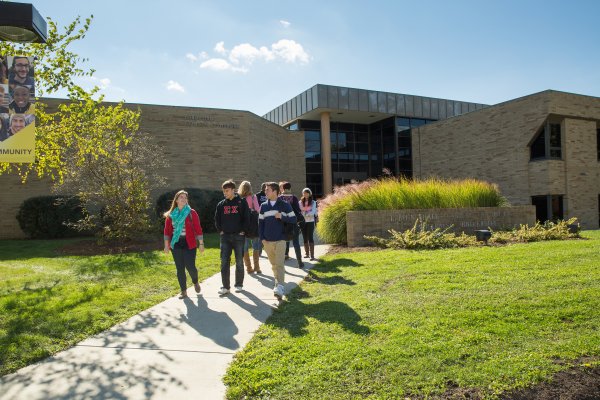FAQs
Yes, the PA Program is accredited. Only the graduate MSPA portion of the 5-Year PA Program undergoes accreditation by the Accreditation Review Commission on Education for the Physician Assistant (ARC-PA). The undergraduate BSHS portion of the PA Program is accredited by the Higher Learning Commission just like all undergraduate programs at Valparaiso University.
Yes it does! As designed, this is a program in which students will come to Valparaiso University as a first semester freshman to complete a five year curriculum and earn both a Bachelor of Science in Health Science and a Master of Science in Physician Assistant Studies.
Students admitted to Valparaiso University will have the opportunity to pursue a Master of Science in Physician Assistant Studies and complete the degree in only five years, provided all progression and retention criteria are met.
Students who submit results of Advanced Placement examinations are eligible to receive credit for the undergraduate BSHS degree in accordance with the table published in the General Catalog, “Advanced Placement Program” section with the exception of general chemistry. If general chemistry credit were awarded, the typical amount of time between high school chemistry and undergraduate organic chemistry would be five years and that would place students at risk of performing poorly. No Advanced Placement credit is given toward the graduate MSPA degree.
Yes. Only undergraduate students will be eligible for transfer into the BSHS portion of the 5-Year PA Program. No transfer students are accepted into the graduate MSPA portion of the program. See further details under the Program Admission section.
Students will be admitted as an undergraduate Health Science major. However, the actual PA specific program doesn’t begin until the professional/graduate phase during the last two years.
Yes, financial aid is available for those who qualify. The 5-Year PA Program includes a slightly different package than most other programs. Please contact Student Financial Services directly at 219.464.5015 or at finaid@valpo.edu for additional and specific information.
Physician assistants treat millions of people in a variety of health care settings–from offices, clinics, and hospitals to nursing homes, long-term care facilities, and military health centers. Physician assistants work in all areas of medicine, including primary care and family medicine, emergency medicine, pediatrics, and psychiatry.
All admitted students must have successfully completed four years of lab science: biology, chemistry, anatomy/physiology, and physics are recommended. In addition, students must have taken enough math to place into or higher than MATH 114, which is pre-calculus.
No. Upon successful completion of the pre-professional/undergraduate phase of the program, students will earn a Bachelor of Science in Health Science (BSHS)–at the end of year three. The Master of Science in Physician Assistant Studies (MSPA) is earned after successful completion of the graduate phase–at the end of year five.
Yes. The undergraduate portion is year-round for three years, including three summers. Required summer courses consist of elective courses and field experiences, both of which can be completed in the student’s home town.
Prospective students can contact the Office of Undergraduate Admission at 219.464.5011, send an email to undergrad.admission@valpo.edu, or visit the Undergraduate Admission website.
No, we do not participate in CASPA. Prospective students will apply to our program though the University’s Office of Undergraduate Admission.
The PA Program is completed only as a full-time, cohort program. Regularly scheduled classes occur only during daytime hours. The graduate phase begins in the fall, and students graduate two years later in August after successful completion of all academic requirements.
Professional training as a physician assistant is a major undertaking, and every student is expected to make studies their first priority. Because of the rigor of both the didactic and clinical education phases of the MSPA Program, students are discouraged from seeking employment.
Students in the MSPA program at Valparaiso University complete their clinical rotations in a variety of settings, including in-patient facilities, out-patient facilities, long-term care, and office settings. Rotations may occur at large teaching institutions or small, rural facilities under the supervision of experienced clinicians. Many clinical sites are located throughout northwest Indiana while others may be located in the Chicago and South Bend areas. Students complete a total of nine rotations (each of which are five weeks in duration). Required specialties include emergency medicine, family practice, internal medicine, obstetrics/gynecology, surgery, pediatrics, and psychiatry/behavioral medicine. Students select two elective rotations in order to gain additional experience in a specialty of interest. Some examples of elective rotations include cardiovascular surgery, orthopedics, dermatology, and research.
No, finding and assigning clinical experiences is the responsibility of the program; prospective or enrolled students must not be required to provide or solicit clinical sites or preceptors.
The PANCE is a national certification exam that is recognized by all 50 states. Upon graduation and passage of the PANCE, you would be eligible to apply for a license to practice in any of the 50 states. There are no separate state licensure exams for PAs. More information may be found on the AAPA’s Career Central page at: https://www.aapa.org/career-central/
The only prerequisite for advancing to the professional MSPA phase of the program is to complete the BSHS degree. We do not require the GRE. You can find those details on the MSPA Admittance Pathways page of the PA Program website. The progression criteria for the BSHS degree may be found in the General Catalog.
